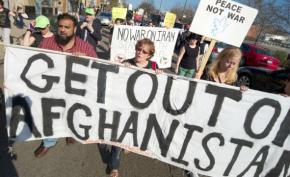Continuing the antiwar fight
reports on the discussion at UNAC's second national conference.
MORE THAN 500 activists attended the second United National Antiwar Coalition (UNAC) conference, which was held in Stamford, Conn., from March 23-25. Activists at the event took part in more than 50 sessions covering a variety of topics on U.S. wars abroad and at home, and made decisions about the coalition's direction for the coming year.
UNAC formed at a meeting in Albany, N.Y., in 2010 with the goal of building a unified antiwar coalition independent from political parties, fully democratic and unconditionally against U.S. intervention around the world. Its goal from the start has been to build mass actions while creating a large and inclusive movement.
One of the most significant developments was the participation of the Muslim Peace Coalition USA, an organization of Muslim Americans spanning 15 states that seeks to fight Islamophobia and organize antiwar actions. The group bussed in about 200 attendees who took part in the conference during the course of the weekend.
"The conference was an important step forward for UNAC and the antiwar movement," said Joe Lombardo, UNAC co-chair. "We had a very good turnout at a time that some don't think it important to keep an antiwar movement going. The turnout was more youthful and diverse than at our first conference, and the large turnout of Muslims was very important. I also think a number of groups who have related to UNAC have become more involved through the conference."

Going forward, participants endorsed a draft action proposal that lays out UNAC's positions, perspectives and goals. Most significantly, the group committed to making two events in Chicago, where the NATO military alliance will meet in May, a focal point for organizing: the People's Summit on May 12 and 13 and the demonstration against NATO on May 20.
In addition, UNAC voted to get behind a June 16 march and rally called by Desis Rising Up and Moving and the Muslim Peace Coalition to protest the New York Police Department campaign of spying, targeting and profiling of Arabs and Muslims.
"Today, UNAC is a well-established force on the left, the largest and most visible coalition in the country," said Marilyn Levin, co-chair of UNAC, during her opening remarks at the conference. "We see our role as making the connections between the issues we all deal with as coming from the same source--the profit-making demands of the 1 percent."
SPEAKERS AT the conference included David Swanson, a leader of WarIsACrime.org; Andrew Murray, leader of the Stop the War Coalition in Britain; Monami Maulik, founder and executive director of Desis Rising Up and Moving; Medea Benjamin, cofounder of both Code Pink and Global Exchange; Clarence Thomas, of International Longshore and Warehouse Union Local 10; Anthony Arnove, co-editor of Voices of a People's History of the United States; Imam Abdul Malik Mujahid, founder of the Muslim Peace Coalition; and dozens more.
The conference had tense moments as well. A debate on whether to take a position against the Iranian regime and build solidarity with Iranian activists fighting for self-determination while also opposing Western intervention was heated.
Activists from two groups--the Raha Feminist Collective and the newly-formed Havaar: Iranian Initiative Against War, Sanctions and State Repression--introduced a motion to add the following statement to UNAC's draft action proposal: "We oppose war and sanctions against the Iranian people and stand in solidarity with their struggle against state repression and all forms of outside intervention." A second resolution--with language about both Syria and Iran--was also introduced.
UNAC's Administrative Committee put forward an amendment with strengthened language about support for self-determination, but which didn't talk about the issue of state repression within Iran.
During the discussion, attendees who offered implicit or explicit support for the Iranian government sharply criticized the activists from Raha and Havaar. One activist even boasted of having dined with Iranian President Mahmoud Ahmadinejad on two occasions. Another likened criticizing regimes that are targets of U.S. imperialism to blaming the victims of rape for being attacked. Others pledged to leave UNAC if the Raha/Havaar resolution passed.
Attendees were able to vote up or down on all three motions. Ultimately, a majority of attendees voted to support the Administrative Committee resolution. The other two resolutions fell by roughly two-to-one margins.
The debate raises important questions about what it means to be anti-imperialist, especially in the post-Arab Spring era. Vijay Prashad, who spoke on the final day of the conference, said it was time to move beyond the idea that the only option for leftists is to oppose war while supporting regimes targeted by U.S. imperialism, or to support war while opposing repressive regimes.
As Prashad wrote in a recent article on Syria:
The left outside has to commit itself to fight against imperialism's habits, as the United States and its North Atlantic allies try to re-erect their four pillars: oil, Israel, stable allies (i.e. the Gulf Arab monarchies) and the encirclement of Iran. We have to be vigilant on two fronts: 1) to not let our anti-imperialism lead to the defense of authoritarian regimes in the region; and 2) to not let our enthusiasm for rebellion lead to cheering on the cruise missiles from U.S. warships. These two sirens should worry us as we make our hesitant way alongside the rebirth of a new left in the Arab world.


